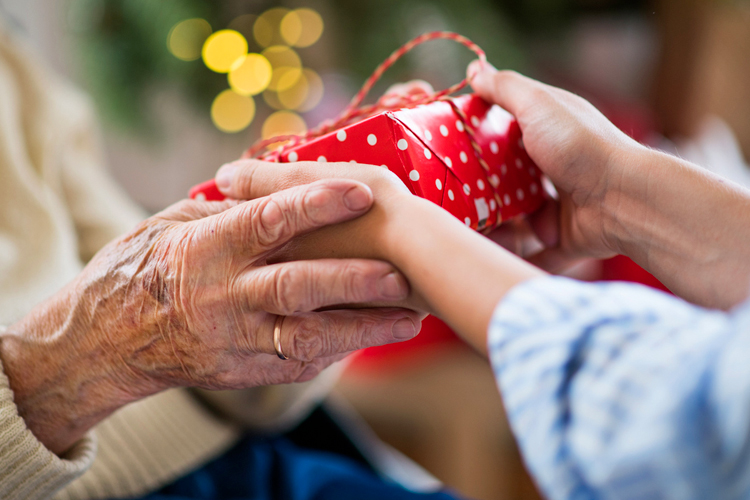For many families, the holidays are about spending quality time with loved ones. But the holidays can be challenging for people with a disability or dementia and those who care for them. With a few helpful holiday tips for caregivers, we hope this season can be less stressful and more enjoyable.
Holiday Tips for Caregivers At a Glance
- Schedule smaller gatherings at optimal times for your loved one
- Serve familiar, easy-to-eat foods
- Prepare your space with proper lighting and room temperature
- Speak clearly and make eye contact
- Accept and/or ask for help from friends and family
- Create new traditions that work for your situation
- Take photos and videos of special moments
How to Create a Comfortable Environment for Your Loved One
It’s important that you update family and friends about your loved one’s condition. This is especially important if changes in appearance or behaviors and increased memory loss have become more apparent. Be honest. The purpose is to maintain your loved one’s dignity, avoid distress, and create a calm and comfortable environment.
Recognizing agitation, stress and discomfort and responding early can help put your loved one at ease. Signs include withdrawal and seeking isolation, repetition in behaviors and speech, pacing and outbursts. If your person is self-isolating, allow them that time. Avoid continued coaxing, as this may lead to agitation.
Tips for hosting an enjoyable holiday gathering
- Schedule small group visits with family and friends, rather than one big gathering.
- Gather at a time that is best for your loved one, such as the time of day or evening when they’re most alert and at their best.
- Serve foods your loved one enjoys. Choose foods your loved one will recognize and enjoy, and that are easy to eat.
- Include level-appropriate activities that your person can participate in so they feel included.
- Choose music that is soothing.
- Limit holiday decorations. Avoid clutter and possible tripping hazards.
- Ensure proper lighting and room temperature.
- If your loved one has memory loss, ensure that people introduce themselves and state who they are in relation to that person. Better yet, wear name tags.

Seven Communication Tips for Caregivers of Loved Ones with Dementia
If your loved one is living with dementia, positive communication is crucial to your and your loved one’s well-being. Try these communication tips to help guide conversation for an enjoyable, relaxed gathering.
- Use clear, simple communication.
- When recalling past events, start with, “I remember when…,” rather than, “Do you remember…”
- Be aware of the tone of your voice. Speak slowly and clearly and allow the person time to respond.
- Follow and engage in their conversation. Validate any concerns expressed.
- Make eye contact. If the person uses a wheelchair, meet them at eye level.
- Be calm, even if your loved one is upset.
- When assisting with personal needs, whisper in their ear.
- Above all, be patient.
This resource for communicating with a loved one with dementia can be downloaded and shared with family and friends.
Holiday Self-Care Tips for Caregivers
Prioritizing your own self-care is an essential part of caregiving. When your physical, mental, and emotional well-being are tended to, you are better able to provide care for your loved one. Taking time to decompress and be rejuvenated is beneficial for everyone.
Here are a few ways you can take care of yourself and avoid caregiver burnout this holiday season:
- Join a support group.
- Don’t take anything personally.
- Let go of traditions if they are no longer working for your loved ones. Make memories with new traditions.
- Breathe deeply and allow family and friends to provide you with moments of respite. Step away, mingle, and enjoy.
- Make sure you are eating well and drinking plenty of water.
- When others ask if or how they can help, don’t be shy. Tell them what you need – preparing food for the gathering, running specific errands, bringing frozen prepared foods, an IOU for caregiving that offers you respite, etc.
- Take photos and videos to record special and humorous moments.
- Enjoy this cherished time with your loved ones.
Year-Round Support for Caregivers
Caregivers wear many hats and must be skillful in numerous areas. Being responsible for the health and safety of another adult is no easy feat. Caregivers may be called upon to do things that they have never been responsible for, such as paying bills, tracking medications, or providing personal care, including bathing, toileting, and oral hygiene.
Caring for a person with dementia can be very stressful. Caregivers will need help at some point, but where can they turn for that support?
Cappella of Grand Junction hosts Memory Café, a wonderfully welcoming place for individuals with Alzheimer’s and other types of dementia or brain disorders and their caregivers. In this safe and comfortable space, caregivers and their loved ones can socialize, enjoy good food, listen to music, play games and take a break from the normal routine. For more information on either of our community support programs, please contact us at 970.822.7070.
Surviving and thriving as a caregiver
In a 2023 discussion about surviving and thriving as a caregiver, Christian Living Communities President & CEO Jill Vitale-Aussem spoke with Mary Daniel, nationally known caregiver advocate, speaker, and founder of Caregivers for Compromise Facebook Group, and Cameron Crawford, owner of Next Steps Senior Placement and founder of the Aging Parent Tribe Facebook Group, about the importance of taking care of and being compassionate with oneself on the caregiving journey.






